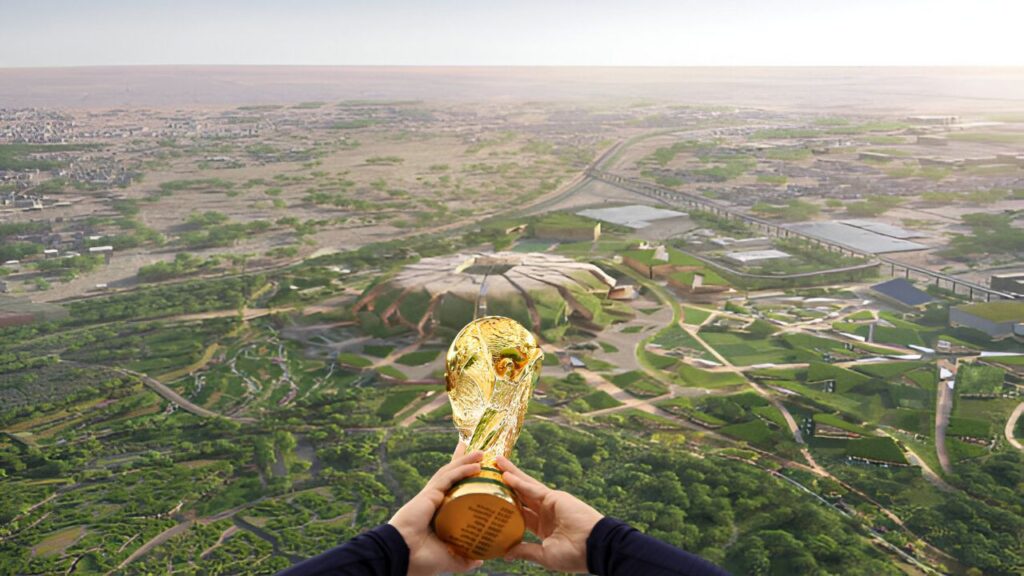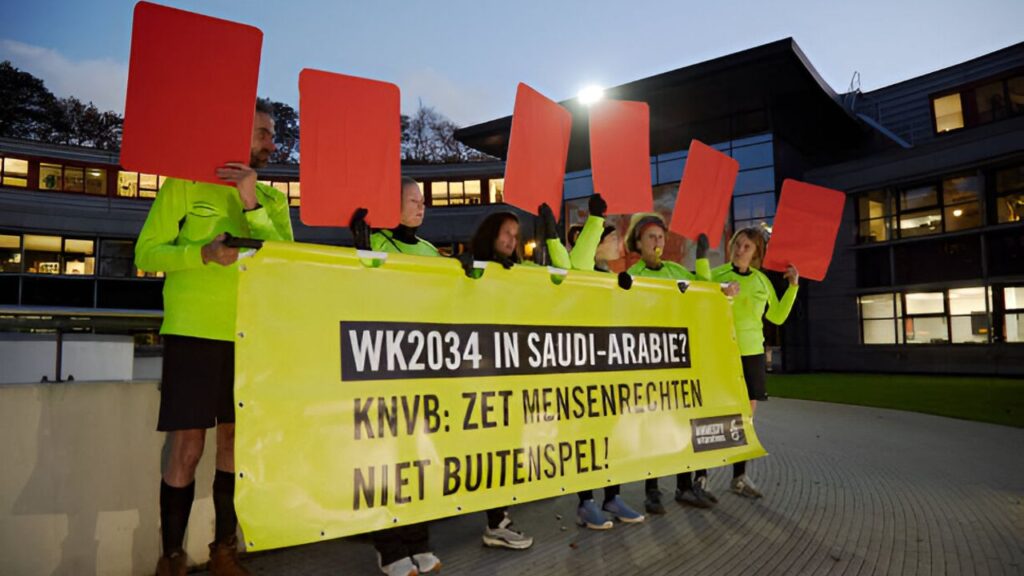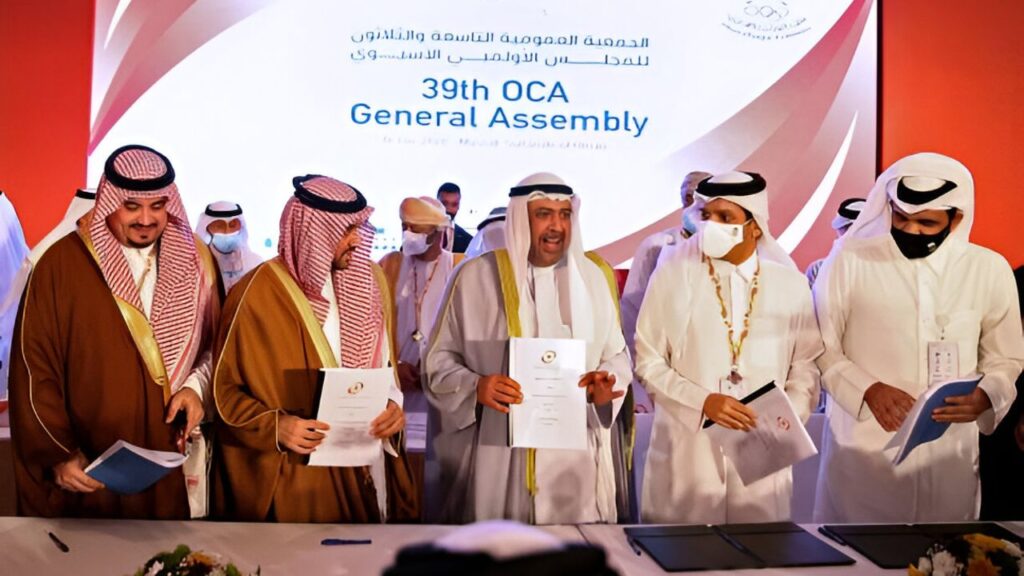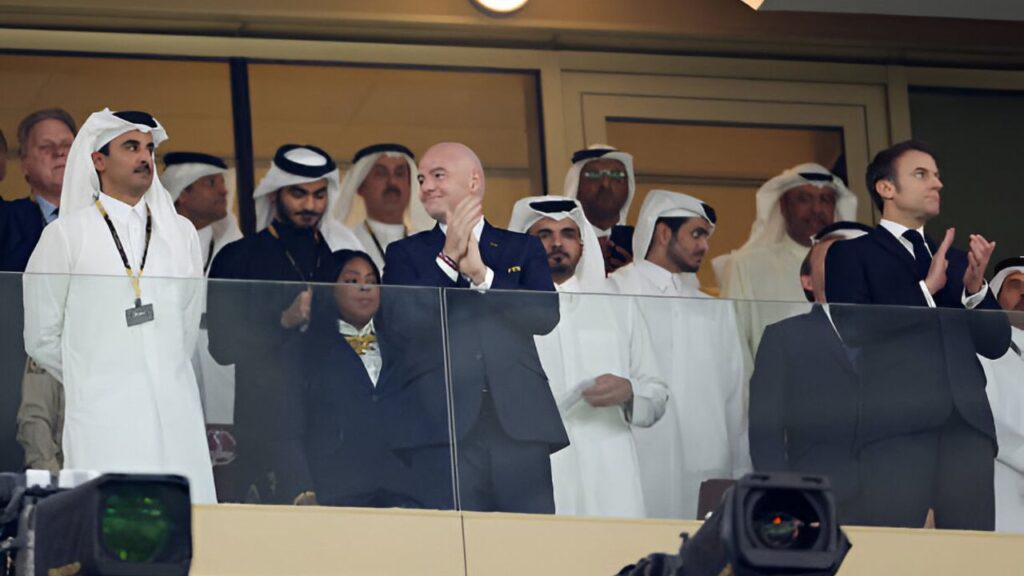The reason for this is that there is only one bid for both the FIFA world cup 2030 and 2034 tournaments. In 2030, Spain, Portugal, and Morocco will all host the World Cup together, while Saudi Arabia is the only option for wm 2034.
Both bids have been looked at closely, but the second one has caused the most trouble.
Michael Page, deputy Middle East and North Africa head at Human Rights Watch (HRW), recently said that putting on what might be the biggest sporting event in the world in Saudi Arabia would have a “unimaginable human cost.”
Several groups of human rights in saudi arabia have been warning about problems in the Gulf nation, such as the mistreatment of migrant workers, restrictions on free speech, and attacks on the rights of ethnic groups.
What does FIFA say, though? Why does Saudi Arabia really want to host the event? What can be done to make the competition safer, if anything?
Summary
| Topic | Details |
|---|---|
| 2034 World Cup Host | Saudi Arabia is expected to be named the host country for the 2034 FIFA World Cup. |
| FIFA world cup Bidding Process | Saudi Arabia world cup bid 2034: The only bidder for the tournament, while Spain, Portugal, and Morocco are set to host the 2030 World Cup. |
| Human Rights Concerns | Human rights groups, including Human Rights Watch (HRW), warn of a significant “unimaginable human cost” in hosting the World Cup in Saudi Arabia. Concerns include the mistreatment of migrant workers, restrictions on free speech, and attacks on ethnic groups’ rights. |
| Investing in Sports | Saudi Arabia is investing billions of dollars in sports through its sovereign wealth fund (PIF), as part of the Saudi Vision 2030 initiative to diversify its economy. This includes acquiring sports teams like Newcastle United and attracting major soccer stars like Cristiano Ronaldo and Neymar Jr. |
| FIFA’s Stance | FIFA has acknowledged concerns over human rights but believes the World Cup could have a positive impact in line with Saudi Arabia’s Vision 2030. They claim the bid has shown concrete commitment and the 10-year time frame provides a mitigating factor. |
| Human Rights Issues in Saudi | HRW’s report highlights migrant workers’ poor conditions, including forced labor, passport confiscation, and delayed payments. Women, LGBTQ+ rights, and freedom of the press are also major concerns. |
| Clifford Chance Report | FIFA’s human rights evaluation report based on research from AS&H Clifford Chance rated the risk to human rights as “medium,” with no independent human rights groups involved in the assessment. |
| Al-Hathloul’s Criticism | Lina al-Hathloul, a human rights advocate, criticized the process, stating that Saudi Arabia remains a police state under Crown Prince Mohammed bin Salman (MBS). She cited issues such as arrests for tweets, executions, and torture in prisons. |
| Saudi Arabia’s Progress | Hammad Albalawi, responsible for Saudi Arabia’s bid, acknowledged the country has made progress on human rights but stated there is still much to be done. |
| Concerns about Sportswashing | Critics argue Saudi Arabia’s World Cup bid is an attempt to “sportswash” the country’s human rights record. MBS has admitted that he does not mind if the investment is seen as such, as long as it boosts the country’s GDP. |
| FIFA’s Response to Criticism | FIFA has been criticized for not doing enough to hold Saudi Arabia accountable for human rights abuses. HRW urges FIFA to delay the decision on the World Cup unless substantial reforms are made. |
| Comparison to Previous World Cups | Similar criticisms arose during the 2018 World Cup in Russia and the 2022 World Cup in Qatar, both of which faced scrutiny over their human rights records. FIFA is seen by some as having learned the wrong lessons from these events, with concerns that it will ignore these issues in favor of financial and political goals. |
| Hope for Change | Al-Hathloul remains hopeful that there could be positive changes in Saudi Arabia over the next 10 years, as FIFA’s decision to award the World Cup gives an opportunity to challenge the status quo and push for reforms. |
Investing in Saudi

Before you can understand the problem, you need to see it in a bigger picture. Their bid for the World Cup isn’t just a one-time thing; it’s part of a larger plan to put money into sports.
Saudi Arabia has spent billions of dollars through its sovereign wealth fund, the Public Investment Fund (PIF), to change the way sports like golf, fighting, e-sports, and Formula One are played.
The country says the investment is part of Saudi Vision 2030, a plan led by Saudi Crown Prince Mohammed bin Salman to make the economy more diverse and make Saudi Arabia one of the most important countries in the world.
It has stood out for its focus on soccer, which is probably the most popular sport in the world.
In the past few years, Saudi Arabia has bought Newcastle United, a famous soccer team in the English Premier League, and gotten many famous players to join the Saudi Pro League. Most famously, Cristiano Ronaldo, Karim Benzema, and Neymar Jr.
🎉⚽️ Cristiano Ronaldo: The best way to kick off the year! 😜🔥 Ready to see more incredible goals and unforgettable moments in 2025! Let’s go! #CR7 #NewYear #FootballLegendhttps://t.co/cVO4ntGhaC pic.twitter.com/pWMh07lkGO
— Action Games Now (AGN) (@ActionGameNow) January 11, 2025
Also, the Saudi crown prince Mohammed bin Salman Al Saud (Arabic: محمد بن سلمان آل سعود), whose initials are MBS, has become friendly with FIFA President Gianni Infantino. Infantino has continued to accept investment from the Gulf country in sports.
The Kingdom’s move into sports is like the cherry on top; hosting a World Cup is the pièce de résistance.
It’s not a surprise that the country has big event plans. In addition to building or renovating 11 arenas and 185,000 new hotel rooms, it has promised to work on big infrastructure projects.
Some human rights groups say that a Saudi World Cup in 2034 will cost a lot.
Concerns about human rights

“Die First, and I’ll Pay You Later,” a new report from HRW, says that Saudi Arabia is using the tournament to “wash away its poor human rights reputation.”
While HRW says that migrant workers will do most of the work to make Saudi Arabia’s World Cup dream come true, the study is mostly about how they are treated.
There are still a lot of migrant workers in the “Kafala” system, which ties people to one company. In June, HRW said that workers are “vulnerable to widespread abuse,” such as contract substitution, excessive recruitment fees, not being paid wages, having their passports taken away by bosses, and being forced to work.
HRW said that employers “still hold disproportionate control over workers,” even though Saudi Arabia has revealed a number of reforms in the last few years.
Concerns have also been raised about the rights of women, the freedom of the press, and how LGBTQ+ groups are treated.
The FIFA study that looked at Saudi Arabia’s bid recently said that the risk to human rights was “medium.”
The report and designation are based on information given by the Riyadh-based law company AS&H Clifford Chance, which was asked to do an independent assessment of human rights.
FIFA also said in its report that “hosting the competition has a good chance of having positive effects on human rights in line with Saudi Arabia’s Vision 2030.”
It also said that “the bid and its key stakeholders have put in a lot of work and shown a high level of concrete commitment. The rate of progress that has been shown and the 10-year time frame are also mitigating factors to think about.”
Lina al-Hathloul, Head of Monitoring and Advocacy at ALQST for Human Rights, said that the assessment wasn’t valid because, during the bidding process, no independent human rights group has been able to work in Saudi Arabia.
Living in Saudi Arabia under MBS’s rule has shown Al-Hathloul how harsh life can be. In 2018, her sister went to jail for running a women’s rights group. She is still banned from leaving the country and can’t travel. She says that al-Hathloul hasn’t seen her family in seven years because she left the country.
She told REPORTER Sport’s Amanda Davies, “Saudi Arabia is a police state run by Crown Prince Mohammed bin Salman with no checks and balances.”
“He has arrested people for tweets, and the number of executions has reached an all-time high.” In Saudi Arabia’s history, 300 people have been put to death this year, which breaks the old mark.
People who fight for women’s rights are jailed for violating human rights. There has been a record amount of sexual harassment and torture in jails. This is against the law, but my family can’t move because one of us fights for women’s rights.
“No country is perfect; all of them break human rights. But I think it’s about setting lines.” Today, with MBS in charge, Saudi Arabia has crossed that line.
REPORTER has asked Saudi Arabia to say something.
Clifford Chance says in its report that the assessment was made in six weeks.

It said, “Due to the short time frame, it is based on desk research and engagement with the Ministries identified.” These Ministries include the Ministry of Sports, the Ministry of Human Resources and Social Development, the Ministry of Interior, and the Ministry of Care for Persons with Disabilities.
“The evaluation process did not involve talking to outside stakeholders or rightsholders.” When looking at published comments, we focused on what well-known monitoring groups that are in charge of interpreting and keeping an eye on how the Instruments are used had to say.
Human rights groups have also said that Saudi Arabia and FIFA are not doing enough to bring about good change.
HRW asked FIFA not to say that Saudi Arabia would host the World Cup “until the rights of migrant workers and women, press freedom, and other human rights are protected.”
It also asked the governing body to put pressure on Saudi Arabia to “engage with human rights stakeholders and allow independent monitoring of human rights in the country.”
Human Rights Watch has also asked FIFA to “halt the process” of giving the tournament to Saudi Arabia “unless major human rights reforms are announced.”
A statement to REPORTER from FIFA said, “Following the same thorough bidding processes for the 2030 and 2034 FIFA World Cups as were used to choose the hosts for the FIFA Women’s World Cup 2023 in Australia and New Zealand, the FIFA World Cup 2026 in the United States, Mexico, and Canada, and the FIFA Women’s World Cup 2027 in Brazil.”
Many people have said bad things about Saudi Arabia’s human rights record, and the country has fought back against claims of “sportswashing,” which is when countries use big sports events to make their country look good around the world, usually to draw attention away from alleged wrongdoing.
In a 2023 interview with Fox News, MBS said that he doesn’t “care” if the investments of the country are called “sportswashing” as long as it “increases my GDP by one percent.”
This year, though, Hammad Albalawi, who was in charge of Saudi Arabia’s bid for the 2034 World Cup, said that the country had made progress in recent years when it came to human rights.
“We still have a long way to go after having come this far.” The thing we try to do is make something that works for us. Alawi told Reuters, “Our journey began in 2016, not because we wanted to host the World Cup.”
After Qatar

Many soccer fans around the world will be familiar with these kinds of conversations from the last two World Cups, in Russia and Qatar, where human rights problems came up.
The most similar event might have been the 2022 World Cup in Qatar, which also got a lot of bad press for how it treated foreign workers.
People said that Qatar was “sportswashing,” but the country said it would use the attention from the World Cup to help the country move forward.
According to FIFA, there had been “undeniable progress” in the country since the tournament in 2023. They said that the tournament was the “catalyst for these reforms.”
He says that FIFA learned the wrong lessons from two years ago, though. Steve Cockburn is the Head of Labour Rights and Sport for Amnesty International.
“I’m afraid that they’ve learned from Qatar that they can handle criticism.” “It won’t matter because they have bigger political and financial goals,” he told REPORTER’s Davies.
Cockburn also said that an event like the World Cup could make things better, but only if people really want to make those things better.
Like many others, he was happy when FIFA became the first global sports organization to include human rights in the bidding process in 2017. However, he has been unhappy with how it has been put into place.
“When (FIFA) gives out awards for the world’s biggest sporting event—the most watched and most visited—it has a duty to make sure it doesn’t hurt workers, fans, activists, and reporters,” he said.
“FIFA said that itself; it just needs to keep the promises and values it has made.” Even though it acts like it is following those rules, it’s not. That’s a very dangerous front. We’ve been following a set plan here.
He also says, “When it came down to a World Cup in Saudi Arabia or its human rights record, it chose the World Cup in Saudi Arabia.”
Meanwhile, Al-Hathloul is still hopeful that things can change in Saudi Arabia. He says that the people of the country deserve to enjoy a World Cup, even though he admits that the process has ruined the chance.
She says FIFA is “complicit” in making it so that Saudi Arabia hasn’t had much of a reason to improve human rights because it doesn’t have much competition.
She said, “You have to challenge, question, and talk about what is going on in the country in order for change to happen.”
“Now we have 10 years to really push for positive change, to really challenge people to speak out, and to really question things.”
Most of the time, people have taken money from Saudi Arabia in exchange for staying quiet. Things might change in 10 years, but people need to be stronger than this.
World Cup 2034 Logo

FIFA stated on October 31, 2023, that Saudi Arabia was the only country chosen to host the tournament. At the FIFA Congress in Zürich, Switzerland, on December 11, 2024, Saudi Arabia was chosen as the host country.








Comments are closed.